- Home
- Courtney Milan
This Wicked Gift Page 4
This Wicked Gift Read online
Page 4
“No need? You said that everything worthwhile had a price. You were wrong. You are absolutely and without question the most completely misinformed man in all of creation. Everything really worth having,” she said, “is free.”
“Free?”
“Given,” she said, “without expectation of return.” And she looked up at him, a fierce light in her eyes. “I wanted to show you.”
That clear trust in her eyes was unbroken yet. He’d taken her virginity. How had she managed to keep her innocence?
“I have no notion what love is,” he told her, almost in a panic. “None at all.”
She picked up her cloak and shook it out. It flared about her shoulders and then fell, obscuring in thick wool the figure he had seen in such heartbreaking detail mere minutes before. “Well,” she said. “Perhaps one day you’ll figure it out.”
And like that, she slipped past him. He listened, unmoving, as she stepped down the stairs and out of his life.
Chapter Three
IT WAS LATE AFTERNOON when Lavinia slowly climbed the stairs to the family rooms above the lending library. She ached all over, a vital, restless throb that twinged in every muscle.
“Lavinia?” Her father’s weak call came from across the way. “Is that you?”
“Yes, Papa.” She took off her cloak and hung it on a peg by the door. Half boots followed. “I went out on a…constitutional after service. I’ll freshen up and join you shortly.”
She ducked into her own room.
As far as the basics went, her small chamber was not so different from William’s. The walls were whitewashed, the furniture plain and simple, and almost identical to his: washstand, bed, chair and a chest of drawers. Lavinia crossed to the other side of the room and poured water from a pitcher into the basin. As she washed, she examined her reflection in the mirror.
She knew what she was supposed to see. This was the face of a girl who’d been ruined. A woman of easy virtue.
The face that peeked back at her looked exactly the same as the one she’d seen in the mirror this morning. There was no giant proclamation writ across her forehead, denouncing her as unchaste. Her eyes did not glow a diabolical red. They weren’t even demonically pink. And her body still felt as though it belonged to her—sore, yes, and tingling in ways that she’d never before experienced—but still hers. Perhaps more so.
He didn’t love her.
Well. So? The reckless infatuation she’d felt hours before had been transmuted into something far more complex and…and cobwebby. She wasn’t sure if the emotion that lodged deep in her gut was love. It felt more like longing. Maybe it had always been longing. In the year since he’d first started coming to their library, he’d looked at her. Until recently, however, he’d always looked away.
It had been an unpleasant surprise when he’d put his proposition to her so baldly—and so badly. But it hadn’t taken her long to understand why he’d chosen to approach her in such a fundamentally uncouth manner. She’d realized with an unbearable certainty that he was deeply unhappy.
In generalities, her room was not so different from William’s. But the specifics… There were nineteen years of memories stored in this room. A blue knit shawl, a gift from her father, draped over one side of her chest of drawers. A lopsided painting of daisies, a present James had given her two years ago, hung next to the mirror. A pine box on her nightstand contained all of Lavinia’s jewelry—a gold chain and her late mother’s wedding ring. These were not mere things, of course; they were memories, physical embodiments of the nineteen years that Lavinia had lived. They were proof that people loved her. Her brother had similar items in his room—a stone he’d picked up years ago on the beach in Brighton, the pearl pendant he’d inherited from his mother, to one day give his wife, and the penknife Lavinia had scrimped to buy him.
Where did William keep his memories? There had been nothing—not so much as a pressed flower—in his quarters. Not a single physical item indicated that he passed through life in contact with others. He must hold his memories entirely inside him.
It seemed a dreadfully lonesome place to keep them.
Things had emotional heft. Lavinia did not imagine a man avoided all mementos because he had been blessed with an inordinate number of good memories. That William had felt compelled to resort to blackmail, when she’d been so giddily inclined to him, said rather more about the light in which he saw himself than how he saw her. For all the harshness of his words, he’d touched her as if he worshipped her. He’d caressed her and held her and brought her to a pleasure that still had her limbs trembling. He might claim to have had no notion of love, but he’d not approached her as if her touches were credits on a balance sheet.
“Vinny?” James swung her door open without so much as a knock.
Luckily, the same absorption that led James to ignore Lavinia’s privacy meant he did not notice her dress was overwrinkled. He did not look in her eyes and see the telltale glow that lit them.
“Vinny,” he said again, “have you taken care of my note yet? Because I could—I mean, I should help.”
And how could she answer? She hadn’t taken care of his note. But James wouldn’t have to worry about the matter ever again. As for William…
Lavinia pasted a false smile across her lips. “You have nothing to worry about,” she said. “It’s all taken care of. He’s all taken care of.”
Or he would be soon.
IT SEEMED INCONCEIVABLE TO WILLIAM that life should continue on as usual the morning after he’d damned himself. The night passed nonetheless. The London streets a few blocks over awoke and rumbled as a hundred sellers prepared for market. Not only did the clock continue on schedule, but—as if fate itself were laughing up its sleeve at him—they marched inexorably on to Monday morning.
Monday. After he’d betrayed all finer points of civilization, nothing so trivial as a Monday morning should have been allowed to exist. And yet Monday persisted.
When William stepped on the streets, he shrank into the shoulders of his coat and pulled his hat over his eyes. But as he walked down Peter Street, nobody raised the hue and cry. No cries of “Stop! Despoiler of women!” followed his steps. Yesterday he’d snared an innocent woman in his bed by the foulest of means. Today nobody even gave him a second glance.
Up until the moment when William arrived at the gray Portland stone building where he worked, just opposite Chancery Lane, the day seemed a Monday much like every other Monday that had come before: gray, dreary and unfortunately necessary. But as soon as William opened the door to the office, he knew that this was not going to be an ordinary Monday.
It was going to be worse. Everyone, from Mr. Dunning, the manager, to Jimmy, the courier boy, sat stiffly. There were no jokes, no exchanged conversations. David Holder, one of William’s fellow clerks, inclined his head ever so slightly to the left.
There stood his employer. The elderly Marquess of Blakely was solid and ever so slightly stooped with age. If one were boasting in a tavern, the man might have seemed the most respectable master, the sort that any employee would feel proud to serve. When William had first arrived, he’d spun a fantasy in which his keen mind and meticulous work made him indispensable to the marquess. In his dreamworld, he’d been granted promotions, advances in wages. He’d won the respect of everyone around him.
That dream had been exceedingly short in duration. It had lasted a week from the day he was hired—until he’d met the man.
The old marquess was a tyrant. In his mind, he didn’t employ servants; he grudgingly shelled out money for minions. The marquess didn’t merely demand the obeisance and courtesy due his station; he required groveling. And, every so often, instead of raising a man up for skill and dedication, he chose an employee and delved into his work until he found an error—and no worker, however conscientious, was ever perfect—and then let the man loose. William and his fellow servants went to work every day swallowing fear for breakfast.
Fear did not sit well on a b
elly and heart as empty as William’s was today. He stood frozen in the old marquess’s gray-browed sights.
“Ah.” Old as he was, the marquess’s gaze did not waver, not in the slightest. It was William who dropped his eyes, of course, bobbing his head in hated obeisance. He fumbled hastily with his hat, pulling it from his head. For a long while the elderly lord simply stared at him. William wasn’t sure if he should offer the insult of turning his back so he could hang up his hat, or if he must stand icebound in place, headgear uncomfortably clutched in his hands.
The marquess turned his head, looking at William side on. With that shock of graying hair, the pose reminded William of some dirty-white bird of prey. The image wouldn’t have bothered him quite so much if William hadn’t felt like so much worm to the other man’s raptor.
His lordship glanced away, and William gulped air in relief. But instead of moving his attention to another man, the marquess simply pulled a watch from his pocket.
“Whoever you are,” he announced, “you’re a minute late to your seat.”
I wouldn’t have been had you not glowered at me. But William held his tongue. He couldn’t afford to lose his position. “I apologize, my lord. It won’t happen again.”
“No, it won’t.” The marquess gave the words a rather more sinister complexion. “Blight, is it?”
“Actually, it’s White, my lord. William White.”
He should not have offered correction. Lord Blakely’s eyes narrowed.
“Ah, yes. Bill Blight.”
He spoke as if William had not worked for him these three years. As if instead of names, his employees were possessed of empty pages, and the marquess could fill those bleak tablets with any syllables he found convenient.
“Come into the back office,” the marquess said calmly. “And do bring the books you’ve worked on for the last two years.”
An invitation to the back office was as good as a death sentence. It felt like an eternity that William stood, fixed in space. But what good would it to do to scream or shout? If he went quietly, Mr. Dunning might help him find another position when he was sacked.
How ironic, that he’d divested himself so unthinkingly of those ten pounds, when he might find them of such immediate use. No—not ironic. It was the opposite of ironic.
Perhaps it was appropriate that he’d been singled out. He wasn’t fit for polite society, after all. Not after what he’d done to Lavinia. How could he ever make it up to her? Maybe this, finally, was the censure he’d been expecting all morning. He’d accept whatever came his way as his just due.
Once inside the back office, the marquess picked one of the books at random. He thumbed through it slowly, his fat fingers pausing every so often, before moving onward. William stared past him. The room’s furnishings could well have been as old as the marquess. The wallpaper had long gone brown, and dry curls of paper at the edge of the baseboard were working their way off the wall.
Finally the lord lifted his head. “You seem to do good work,” the old Lord Blakely said. Said by anyone else, it would be a compliment. But William’s employer twisted the sentence in his mouth, giving a slight emphasis to the word seem. By the ugly glint in his eye, William knew he was adding his own caveat: I am not fooled by your apparent competence.
“Tell me,” the marquess continued. “On September 16, 1821, you entered three transactions related to the home-farm in Kent. I’d like a few specifics.”
Fifteen months ago. The man focused on transactions made fifteen bloody months ago? How could William possibly recall the details of a transaction more than a year in age? One did not keep books so that one could browbeat the person who entered a transaction.
One didn’t unless one happened to be the Marquess of Blakely.
“It is the first transaction, for two pounds six, that I—”
The door opened quietly behind them, interrupting his speech.
The old marquess looked up. His fists clenched on the account book, and his eyes widened. He drew himself up, undoubtedly to castigate the fool who had the temerity to interrupt this ritual sacrifice. William drew his breath in, thinking he’d won a reprieve. If he had, the intruder would undoubtedly take on William’s punishment. Whoever it was walked forward, steady, heavy footsteps crossing the room. A mixture of shame and relief flooded William. Perhaps he might keep his position—but it was a sorry man who hoped his carcass would be saved because a shark choked on another fish first. It was an even sorrier man who hoped so, knowing that of all the fellows in the office, he was most deserving of punishment.
But instead of one of William’s fellow clerks or the estate manager, the young man who came abreast of William’s chair was the one person the old marquess could not sack.
It was his eldest grandson. William had seen the man only once, and at a distance. But he’d been accounting for the details of the man’s funds for three years. Gareth Carhart. Viscount Wyndleton, for now. The man was a few years younger than William. He had attended Harrow, then Cambridge. He had a substantial fortune, received a comfortable allowance from his grandfather, and he would inherit the marquessate. William almost felt as if he knew the fellow. He was certain he held the young, privileged lord in dislike.
The young viscount might have had a hundred servants available to do his bidding. But incongruously, the man was carrying his own valise. He set this luggage on the ground and placed his hands gently on his grandfather’s desk.
No thumping, no shouting, no untoward drama of any sort. Had William not been a mere foot away, he would not even have detected the rigid tension in the muscles on the backs of his hands.
“Thank you very much.” The viscount’s words were quiet—not unemotional, William realized, but so suffused with emotion that only that flat, invariant tone could contain his disdain. “I appreciate your telling the carriage drivers not to take me to Hampshire. I applaud your decision to bribe—how many was it? It must have been every owner of a private conveyance in London, so that they would not take me, either. But it took real genius on your part to outright purchase the Hampshire coach lines in their entirety, five days before Christmas.”
“Well.” The old Lord Blakely preened and examined his nails. Of course, the man did not find anything so uncouth as dirt near his fingers, but he nonetheless brushed away an imagined speck. “How lovely of you to admit my intelligence. Now do you believe that I was serious when I told you that if you did not give up your foolish scientific pursuits, you would not see that woman?”
William might have drowned in the sea of their exchanged sarcasm. Neither man seemed to care that he was in the room. He was invisible—a servant, a hired man. He might have been etched on the curling wallpaper, for all the attention that they paid him.
The young viscount lifted his chin. “That woman,” he said carefully, “is my mother.”
William felt a twinge of satisfaction. He ought not to have reveled in the other man’s pain, but it was delicious to know that even money could not buy freedom.
“I’m leaving,” Lord Wyndleton continued.
“No, you are not. What you are doing is throwing a tantrum, like a child demanding a boiled sweet. It is long past time that you gave up that natural philosophy nonsense and learned to manage an estate like a lord.”
“I can read a damned account book.”
“Yes, but can you manage seventeen separate properties? Can you keep a host of useless and unmotivated servitors bent to their tasks?”
The young viscount’s gaze cut briefly toward William. William felt himself analyzed, cataloged—and then, just as swiftly, dismissed, an obstacle as irrelevant and underwhelming as a dead black beetle lying in the middle of a thoroughfare.
“How difficult can it be?”
“Bill Blight, why don’t you explain to my grandson what I had planned for you?”
“You were, I believe, going to look through my work until you found an error. My lord.” And then you were going to turn me off.
“Bli
ght, tell him what I really intended.”
William pressed his lips together. “You were going to sack me to induce terror in your staff.”
That sort of sentence—bald and unforgiving—ought to have gotten him tossed out on his ear.
Instead, the marquess smiled. “Precisely so. Wyndleton, how do you suppose I managed to thwart your ill-fated flight this morning? I assure you, I did not need to bribe every driver in London. I keep my staff in line—and that means they do as I say, what I say, no matter the cost.”
The young viscount’s nostrils flared.
“You think you can be a marquess? Like that?” The marquess snapped his fingers. “Get your valise. Spend these two days with me—do as I say—and you’ll start to learn how it’s done. Someday you might even get to thwart me. Or you would, if you had the money to do it.”
Still Lord Wyndleton did not move. He stood next to William, his arms rigid, his fingers curving into the desk like claws.
“Come along,” the marquess said. “I shouldn’t have to spoon-feed you these lessons. If you’ll listen to me, I’ll have the carriage take you over late Christmas Eve.” The old man stood up and walked to the door. He didn’t look back.
After all, William thought bitterly, what else could mere mortals do but jump to perform his bidding? The thought almost put him in charity with the man standing nearby. The viscount slowly straightened.
“What I don’t understand,” William said quietly, “is why you don’t buy your own carriage.”
Lord Wyndleton turned to him. This close, William could see the golden brown of his eyes—predator’s eyes, or at least, a predator in training. Like any wolf cub caught in a trap, he snapped in anger at anything that came near.
“He’s holding the purse strings, you idiot.” He straightened and wiped his hands on his sleeves. “My grandfather is sacking you, yes?”
“He’ll get around to it.”
Gareth Carhart, Viscount Wyndleton, picked up the valise. He nodded sharply. “Excellent,” he said, and then he walked out of the room.

 Her Every Wish
Her Every Wish Midnight Scandals
Midnight Scandals After the Wedding
After the Wedding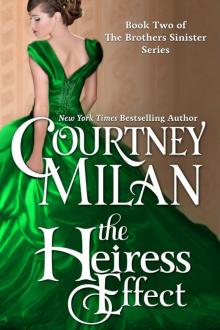 The Heiress Effect
The Heiress Effect Unraveled
Unraveled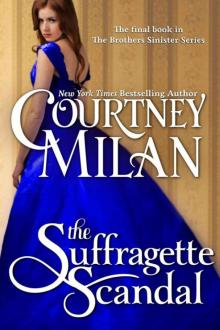 The Suffragette Scandal
The Suffragette Scandal The Year of the Crocodile
The Year of the Crocodile The Duchess War
The Duchess War What Happened at Midnight
What Happened at Midnight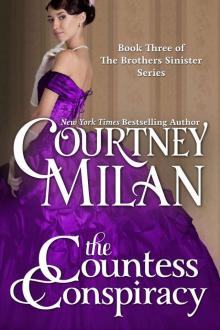 The Countess Conspiracy
The Countess Conspiracy Proof by Seduction
Proof by Seduction Unlocked
Unlocked Trial by Desire
Trial by Desire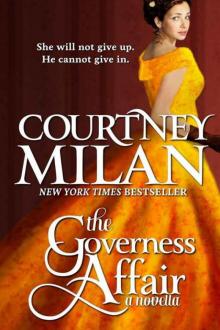 The Governess Affair
The Governess Affair Unveiled
Unveiled The Lady Always Wins
The Lady Always Wins Trade Me
Trade Me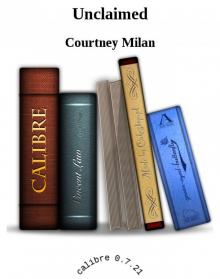 Unclaimed
Unclaimed This Wicked Gift
This Wicked Gift The Duchess War (The Brothers Sinister)
The Duchess War (The Brothers Sinister) Hamilton's Battalion: A Trio of Romances
Hamilton's Battalion: A Trio of Romances The Turner Series
The Turner Series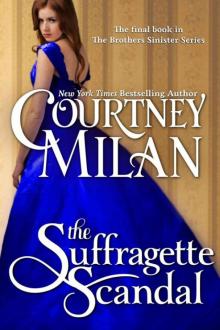 The Suffragette Scandal (The Brothers Sinister)
The Suffragette Scandal (The Brothers Sinister)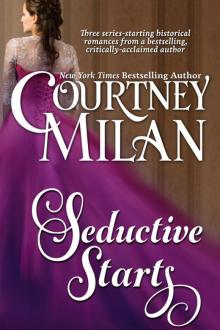 Seductive Starts
Seductive Starts The Pursuit Of…
The Pursuit Of… Hamilton's Battalion
Hamilton's Battalion The Carhart Series
The Carhart Series Seven Wicked Nights
Seven Wicked Nights This Wicked Gift (A Carhart Series Novella)
This Wicked Gift (A Carhart Series Novella)